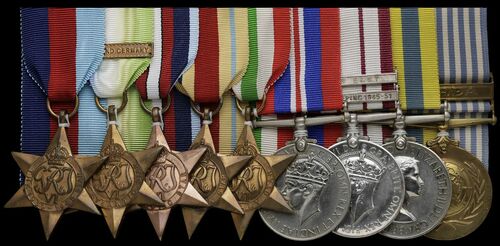
Auction: 23001 - Orders, Decorations and Medals
Lot: 204
Eight: Lieutenant-Commander R. G. Archer, Royal Navy, who served on Arctic Convoy duty and was aboard H.M.S. Edinburgh for her epic three-day battle around Murmansk, which led to the loss not only of the ship but also a consignment of gold bullion to the freezing oceans of the Arctic
1939-45 Star; Atlantic Star, clasp, France and Germany; Africa Star; Italy Star; War Medal 1939-45; Naval General Service 1915-62, 2 clasps, Minesweeping 1945-51, Near East (Lieut. R. G. Archer. R.N.); Korea 1950-53, (Lt. Cdr. R. G. Archer. R.N.); U.N. Korea 1950-54, unnamed as issued, mounted court-style for wear, nearly extremely fine (8)
Robert George Archer was born at Bristol, Gloucestershire on 16 February 1921 and entered the Royal Navy as a Cadet at H.M.S. Vindictive on 1 January 1939. Commissioned Midshipman on 1 September 1939, he was posted to H.M.S. Diomede on 4 August that year. Promoted Sub-Lieutenant on 1 May 1941 he joined the cruiser Edinburgh on 5 September 1941. Aboard her he saw duty with Arctic convoys bringing aid to the Soviet Union - notably PQ 14 which she joined on 9 April as part of the distant covering force headed for Murmansk. During the course of this hazardous journey the convoy only narrowly avoided destruction at the hands of U-376.
Having arrived safely, Edinburgh was sent on an independent mission, leaving Murmansk for the home waters on 29 April and joining up with the escort for convoy QP 11. It was whilst on this duty that, on 30 April, Edinburgh was struck on the starboard side by a torpedo from U-456, causing her to list heavily. A second torpedo hammered into her stern, destroying her steering equipment and crippling her. Desperate to return to Murmansk, Edinburgh was taken in tow by other vessels from the convoy but was now under constant attack from German aircraft and in a truly desperate state.
She was finally cornered by three German destroyers on 2 May but, casting off her tow, she prepared to fight. Only able to steam in circles and with her guns barely functioning, Edinburgh managed to open fire on the enemy - indeed her second salvo scored a direct hit upon one of the German destroyers, damaging her so severely that she had to be scuttled. The rest were driven off by Edinburgh's escorts - however, further damaged by a torpedo strike during the engagement she was finally beyond saving. The crew abandoned ship with H.M.S. Gossamer taking off 440 men while H.M.S. Harrier took about 400. She had taken casualties of two officers and 56 other ranks during her three-day ordeal. In the end it was a British ship which sank Edinburgh, H.M.S. Foresight firing a torpedo which hit her amidships - after gunfire and depth charges had failed to end this almost unsinkable vessel. Unfortunately, it was impossible to remove a consignment of gold bullion from Edinburgh's hold prior to being sunk - a payment from the U.S.S.R. to the Allies for supplies and war materiel worth £1.5 million sterling at the time.
Promoted Lieutenant on 16 September 1942, Archer was appointed to H.M.S. Rockingham and served with her until August 1943. Seeing further service with H.M.S. Keats from 19 October 1943 as 1st Lieutenant, he was posted ashore in Sydney, Australia to Golden Hind in January 1945. Seeing further post-war service with the minesweeper H.M.S Courier from February 1946, he was promoted Lieutenant-Commander on 16 September 1950 and was then in action once more during the Korean War and in the Near East; Archer finally retired on 23 May 1960; sold together with a photograph and former auction listing.
Subject to 20% VAT on Buyer’s Premium. For more information please view Terms and Conditions for Buyers.
Sold for
£1,200
Starting price
£210




